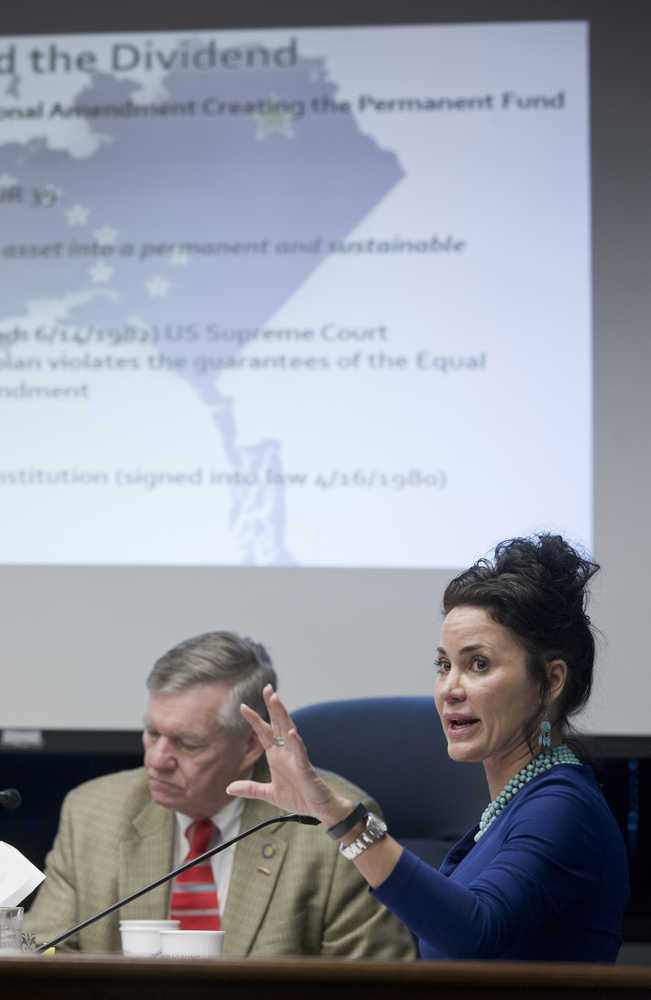For 13 months, Sen. Lesil McGuire, R-Anchorage, has been working on a plan to use Permanent Fund earnings to partially balance Alaska’s state budget.
On Tuesday, she finally unveiled the proposal, which could halve the state’s nearly $4 billion deficit in a single year.
“With my plan, you’ll bring in approximately $2 billion, and that will put you on a glidepath (to balancing the budget),” she told members of the Senate State Affairs Committee.
She added that “mine is not a whole plan,” and while it would eliminate a substantial chunk of the state’s deficit, additional taxes and further cuts will be needed to balance the annual budget.
“This is only meant to stabilize one part,” she said.
In form and function, McGuire’s plan (formally, Senate Bill 114) resembles the one brought forward by Gov. Bill Walker earlier this year. State revenue commissioner Randy Hoffbeck said the governor’s staff and McGuire’s staff used the same financial models and budget figures, and that any similarities aren’t coincidental.
“Quite frankly, I think all the plans out there have the same essential target in mind,” Hoffbeck said.
The principal difference between the two plans is their emphasis. The governor’s plan is designed to provide $3.3 billion per year to fund state government, but after its first year, Permanent Fund Dividends would be about $500 per person.
Senate Bill 114 has a minimum $1,000 dividend, but it provides only about $2 billion per year for state operations.
If oil averages $56 per barrel this fiscal year (July 1, 2015 through June 30, 2016), the state’s annual deficit will be about $3.5 billion. Through Monday, oil has averaged $47.08, which puts the deficit at roughly $3.7 billion.
McGuire said her bill “still leaves open the conversation for restructuring the size and cost of government.”
The mechanics of McGuire’s plan are relatively simple. Right now, investment earnings from the $50 billion Permanent Fund end up in the earnings reserve account. That account pays dividends but otherwise accumulates interest and grows. Right now, it contains about $7 billion.
While no one can spend from the Permanent Fund proper without a statewide vote, lawmakers can spend from the earnings reserve with a majority vote.
McGuire’s plan would set up an annual transfer of 5 percent of the Permanent Fund’s value from the earnings reserve to the state budget. If the Permanent Fund’s $50 billion principal account earns more than 5 percent when invested on global markets, the system holds up.
Dividends, instead of coming from the earnings reserve, would come from the state’s annual oil royalty check. Three-quarters of the state’s oil royalties (last year, about $961 million) would be devoted to dividends. The remaining quarter of the state’s oil royalties would go into the Permanent Fund principal.
If implemented this year, McGuire’s bill would result in a dividend of a little over $1,000. If not implemented, the traditional dividend formula (based on the Permanent Fund’s investment returns) is expected to result in a dividend of more than $2,000.
One thousand dollars is “still a big dividend,” McGuire said, adding that in a state whose economy is dependent upon government spending, it’s important to keep the state budget balanced and stable.
“The Permanent Fund Dividend is important,” she said, “but it’s not the only thing that’s important. Even Republicans can say that.”
The Senate State Affairs Committee will meet again on Thursday to hear legal analysis of the governor’s Permanent Fund earnings plan. On Tuesday, it will hear public testimony on the proposed prison reform bill, and on Tuesday night, starting at 5:30 p.m. in the Capitol, the committee is expected to take public testimony on McGuire’s proposal.

